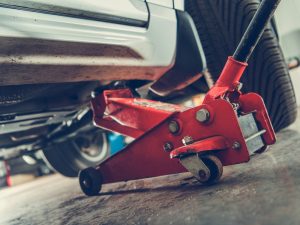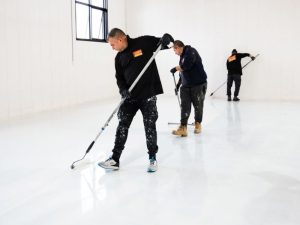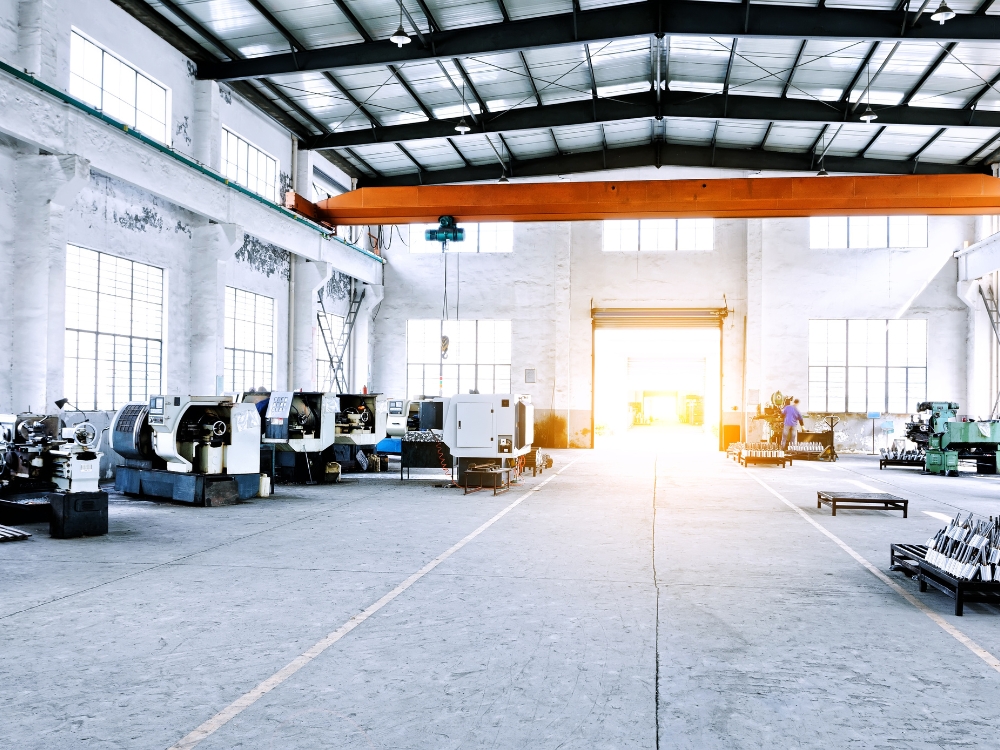Maintaining a level workshop floor is crucial for safety and productivity. However, various factors can cause workshop floors to become uneven over time, causing issues that require attention. Understanding these causes helps address and prevent further damage.
Why do workshop floors develop cracks?
Cracks are a common issue in workshop floors. They can result from several factors, including:
- Heavy machinery: The constant movement and weight of heavy equipment can exert pressure on the floor, leading to cracks.
- Substandard materials: Using low-quality concrete or improper mixing can weaken the floor, making it prone to cracking.
- Ground shifting: Natural ground movements or settling, such as ground subsidence, can cause the concrete to crack. Moreover, understanding ground subsidence is crucial for assessing the risks and implementing effective mitigation strategies.
- Improper curing: If the concrete is not cured correctly, it can dry unevenly, leading to cracks.
How does moisture affect workshop floors?
Moisture is one of the leading causes of floor damage. It can enter through various means and cause significant issues, such as:
- Water seepage: Water from the ground can seep through the concrete if the floor lacks proper sealing.
- Condensation: In humid environments, condensation can form on the floor, leading to moisture-related damage.
- Chemical reactions: Water can react with certain minerals in the concrete, causing expansion and cracking.
- Freeze-thaw cycles: In colder climates, water can freeze and expand within the cracks, worsening the damage.
Can temperature fluctuations cause uneven floors?
Temperature changes can significantly impact the integrity of workshop floors. The effects include:
- Thermal expansion and contraction: Concrete expands in hot weather and contracts in cold weather, causing stress and eventual cracking.
- Extreme temperature swings: Rapid changes in temperature can exacerbate the expansion and contraction cycles.
- Heat-related softening: Prolonged exposure to high temperatures can soften certain floor coatings, leading to uneven surfaces.
- Cold-induced brittleness: In icy conditions, concrete can become brittle and more prone to cracking.
How does wear and tear affect workshop floors?
Regular use can lead to significant wear and tear on workshop floors. Contributing factors include:
- Foot traffic: Constant movement of workers and machinery can cause gradual erosion.
- Machinery movement: Heavy equipment can create ruts and depressions.
- Impact damage: Dropping heavy tools or equipment can chip or crack the floor.
- Surface abrasion: Continuous abrasion from tools and materials can wear down the surface over time.

Furthermore, using the best epoxy floor paint for your workshop can significantly reduce the impact of wear and tear, ensuring a more durable and resistant surface against daily abrasion and heavy machinery.
Are poor construction practices to blame?
Improper construction methods can lead to uneven floors over time. Common construction flaws include:
- Inadequate compaction: Failing to compact the soil properly before pouring concrete can cause the floor to settle unevenly.
- Insufficient reinforcement: Lack of proper reinforcement, such as steel rebar, can weaken the concrete structure.
- Improper pouring techniques: Pouring concrete incorrectly can lead to air pockets and weak spots.
- Lack of expansion joints: Without expansion joints, the floor cannot accommodate movement, leading to cracks and unevenness.
What role do chemical spills play in flood damage?
Chemical spills are a frequent occurrence in workshops and can cause severe damage, including:
- Corrosive substances: Chemicals like acids and solvents can corrode the concrete, leading to deterioration.
- Absorption of spills: Concrete can absorb chemicals, weakening its structure over time.
- Staining and discolouration: Some chemicals can stain the floor, affecting its appearance and integrity.
- Reaction with floor coatings: Certain chemicals can react with protective coatings, causing peeling and bubbling.
Why is regular maintenance essential for workshop floors?
Routine maintenance can prevent minor issues from becoming significant problems. Key benefits include:
- Early detection of problems: Regular inspections can identify cracks and wear early on.
- Preventative measures: Applying sealants and coatings can protect against moisture and chemical damage.
- Prolonged lifespan: Maintaining the floor extends its usability and prevents costly repairs.
- Enhanced safety: A well-maintained floor reduces the risk of accidents caused by uneven surfaces.
What are the long-term solutions for uneven workshop floors?
Addressing uneven floors requires effective long-term solutions, such as:
- Epoxy flooring: Workshop epoxy flooring solutions can level the surface and provide a durable, smooth finish.
- Concrete resurfacing: Resurfacing involves applying a new layer of concrete to even out the floor.
- Floor grinding: Grinding down high spots can create a level surface.
- Expansion joints installation: Adding expansion joints can accommodate movement and prevent future cracking.

Understanding why epoxy resin floors are perfect for workshops can help you choose a flooring solution that offers durability, easy maintenance, and resistance to heavy machinery and chemical spills.
How can you prevent workshop floors from becoming uneven?
Prevention is always better than cure. Steps to avoid uneven floors include:
- Proper installation: Ensuring the floor is installed correctly with adequate materials and techniques.
- Regular sealing: Applying sealants can protect against moisture and chemical damage.
- Routine inspections: Regular checks can catch early signs of damage.
- Immediate spill cleanup: Promptly cleaning chemical spills can prevent absorption and damage.
Protect your workshop floors with Sydney Wide Epoxy Flooring
Uneven workshop floors can be a significant hindrance. Still, with the right solutions, you can maintain a safe and efficient workspace. At Sydney Wide Epoxy Flooring, we specialise in providing top-notch epoxy flooring solutions that are perfect for workshops. Our durable and aesthetically pleasing floors are designed to withstand heavy use, moisture, and chemical spills. Whether you need a new installation or want to restore your existing floors, our expert team is here to help. Contact Sydney Wide Epoxy Flooring for a free consultation and discover how we can transform your workshop floor.

